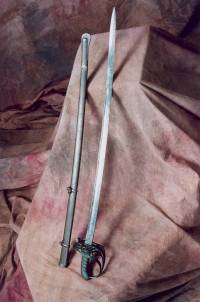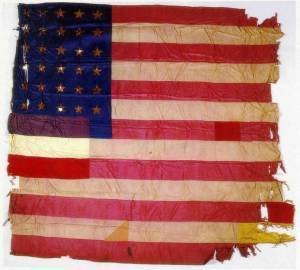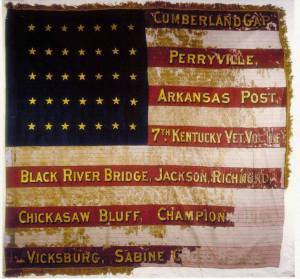|
A well-researched book with extensive footnotes has recently been
published about Col. Reuben May (USA) a first cousin of one of the
best known figures of Eastern Kentucky during the Civil War, Col.
Andrew Jackson May (CSA) of Prestonsburg. Although Reuben knew that
his brothers, cousins and in-laws were showing support for the
Confederacy as the war began, he made his choice for the Union.
Impassioned speeches that he gave years later were unequivocal in
their message:
"The old flag under which Kentucky had thrived and grown,
and under whose beautiful folds I have grown to manhood shall be my
flag, and I will defend it against my neighbors, relatives and
brothers who assail it, though my life be taken, I shall stand for
the Union, I will uphold the flag!"
Reuben May was born in 1815 in a log cabin on Shelby Creek in
present-day Pike County, Kentucky. In 1849 Reuben, his wife, Emmeriah
Honaker, and their seven children moved to Clay County, Kentucky,
where he formed partnerships in the salt manufacturing business as
one of about a dozen suppliers who comprised the well-known Goose
Creek Saltworks.
In September 1861 Reuben reported to Camp Estill Springs, Kentucky,
and was soon named as Lt. Col. of the Eighth Kentucky Volunteer
Regiment. During this same period, Jack May was organizing troops for
the Confederacy in West Liberty and Prestonsburg, where he
established a camp on the farms of Reuben's brothers, Williams James
and Samuel May. In January 1863 Reuben was wounded at Stones River,
Tennessee, where over 23,000 casualties were recorded by the opposing
Armies. Four months later he was promoted to full Colonel and was
assigned to lead the Seventh Kentucky Volunteer Infantry Regiment,
serving at the Siege of Jackson, Mississippi and later in Louisiana.
While the war was still enmeshed in massive troop movements and
bloody battles, Reuben's wife and nine of their children had to flee
to Wisconsin to seek refuge from Rebel marauders in Clay County.
After mustering out of service in October 1864, Reuben moved to a
large farm they had purchased in Vernon County and his pent-up
political ambitions soon came to the forefront. Like his uncle Samuel
May of Prestonsburg, who had served in both houses of the Kentucky
State Legislature in the 1830s, Reuben was nominated and elected to
serve in the 1870 Wisconsin State Assembly. Of his eight political
races from 1869 to 1890, he won only two - both to the Assembly by
large majorities on the Republican ticket. Two of his races for
legislative seats were lost by only a few votes. Reuben became a
spokesman for popular movements of the period, including: the Grange
movement opposing the power of railroads and excessive grain elevator
charges; "greenbacks" vs. the gold standard; compulsory
education of children; and women's suffrage. Details of the
ideologies he espoused are preserved in his speeches and in political
editorials of supporting and opposing newspapers in Wisconsin. |




